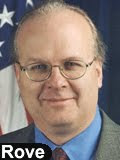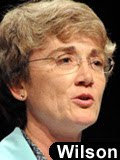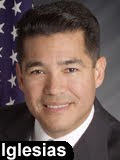 Former White House aide says Wilson complained about ‘the timing of the courthouse construction indictment’ before the election; Wilson says that’s not true
Former White House aide says Wilson complained about ‘the timing of the courthouse construction indictment’ before the election; Wilson says that’s not true
Former White House aide Karl Rove told a House Judiciary Committee investigator that former U.S. Rep. Heather Wilson raised concerns with him about “the timing of the courthouse construction indictment” before the 2006 election.
Wilson says that’s not true.
 The question of whether Wilson was complaining about the timing of indictments in the metro court case before the 2006 election is important because former U.S. Attorney David Iglesias alleges that Wilson and former Sen. Pete Domenici pressured him to speed indictments in the case involving a high-ranking Democrat in an attempt to help Wilson win re-election in 2006.
The question of whether Wilson was complaining about the timing of indictments in the metro court case before the 2006 election is important because former U.S. Attorney David Iglesias alleges that Wilson and former Sen. Pete Domenici pressured him to speed indictments in the case involving a high-ranking Democrat in an attempt to help Wilson win re-election in 2006.
It’s a charge both former members of Congress deny, but it’s now under investigation by a special prosecutor because Iglesias is one of several U.S. attorneys who were fired days after the election.
The contradiction between the Rove and Wilson statements is examined today by The Politico:
“Rove says Wilson pushed the White House to fire New Mexico’s then-U.S. attorney, David Iglesias, before the Nov. 2006 election because he wasn’t moving fast enough on a corruption case involving New Mexico Democrats.
“Wilson said she did no such thing, insisting that she only spoke to Rove once about Iglesias, and that was following the 2006 election at a White House breakfast.
“The ex-lawmaker also said she never mentioned a New Mexico courthouse corruption investigation in her discussion with Rove, a statement that is at odds with the testimony Rove provided to the House Judiciary Committee.”
Iglesias says metro court case ‘was not ready’
 In his testimony (click here and scroll to Page 109), Rove said Wilson expressed concern to him “that Iglesias had a case that ripened and that, rather than filing it when it was ready, he was making a politically charged decision to not move the indictment until after the election, which was again, 9 months, 10 months, 12 months, 11 months after — 14 months after it supposedly ripened.”
In his testimony (click here and scroll to Page 109), Rove said Wilson expressed concern to him “that Iglesias had a case that ripened and that, rather than filing it when it was ready, he was making a politically charged decision to not move the indictment until after the election, which was again, 9 months, 10 months, 12 months, 11 months after — 14 months after it supposedly ripened.”
Iglesias told me earlier this week that the metro court case “was not ready” before the 2006 election, “but even had it been ready I wouldn’t have filed it because (Department of Justice) policy precludes indictments that can be used for political purposes during election season.”
Rove’s lawyer, Robert Luskin, told The Politico that Rove’s “best recollection is that he heard from Wilson before the ‘06 election, during the same time period that Domenici and (Domenici’s former chief of staff) Steve Bell were also complaining about Iglesias’ holding of the courthouse case.”
So Rove is apparently also alleging that Domenici and Bell were complaining about the timing of the courthouse case before the election.
Wilson told The Politico that she “never talked to Mr. Rove about the timing of courthouse cases at any time and had no other communications with him about Mr. Iglesias at any time.” She insisted, according to the article, that the only time she spoke to Rove about Iglesias was at a Nov. 15, 2006, breakfast at the White House.
Regardless, there’s a criminal investigation into Iglesias’ firing that some analysts have said could lead to obstruction of justice charges against Wilson, Domenici, Rove and others. Even if that doesn’t happen, Rove’s testimony could be damaging for Wilson, who has said she may run for governor next year.
Jennings also disputes part of Rove’s testimony
But what if Rove’s testimony isn’t accurate? Wilson isn’t the only one disputing aspects of Rove’s testimony. In an article published yesterday in the Louisville Courier-Journal, a man who was one of Rove’s top aides, Scott Jennings, took issue with Rove’s assertion that Jennings was a driving force behind the firing of Iglesias.
From the article:
“Rove also said the ouster of Iglesias was ‘being provoked by Jennings’ and that the Kentuckian was ‘freelancing’ in pushing for the prosecutor’s removal.
“Jenning’s Washington attorney, Mark Paoletta, said Wednesday that ‘a fair review of the records will show that Scott Jennings’ communications concerning the removal of U.S. attorneys were in reaction to complaints he received and passed along, consistent with his responsibilities in the Office of Political Affairs.’
“‘…The suggestion that Scott may have been ‘freelancing’ to remove particular U.S. attorneys, or did not keep his superiors adequately informed about the nature of the complaints, is pure fantasy,’ Paoletta said.”
You may recall that Jennings is the White House staffer whose Oct. 15, 2006 e-mail questioned why Iglesias was being “shy about doing his job on (Patricia) Madrid,” Wilson’s 2006 opponent. Wilson claims the e-mail chain that includes Jennings’ e-mail, which she started, was about an FBI inquiry into Madrid, not the 2006 election contest between her and Madrid.
